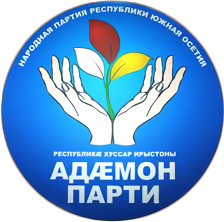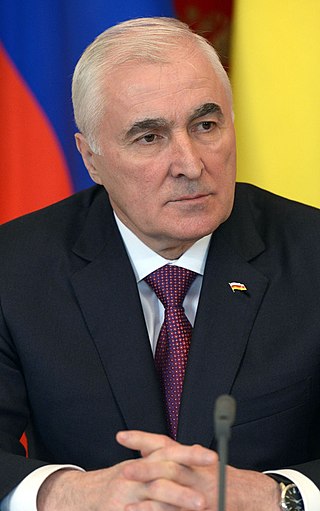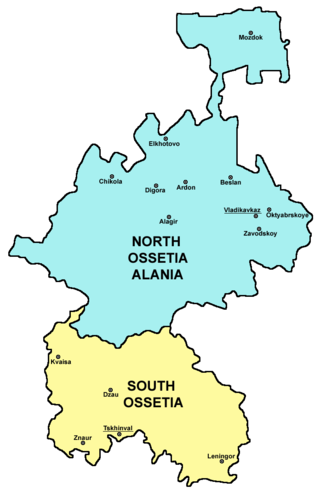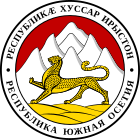
South Ossetia, officially the Republic of South Ossetia or the State of Alania, is a partially recognised landlocked state in the South Caucasus. It has an officially stated population of just over 56,500 people (2022), who live in an area of 3,900 square kilometres (1,500 sq mi), with 33,000 living in the capital city, Tskhinvali.

Eduard Dzhabeyevich Kokoyty is an Ossetian politician who served as the second president of South Ossetia of the partially recognized state of South Ossetia from 2001 to 2011.

The Georgian–Ossetian conflict is an ethno-political conflict over Georgia's former autonomous region of South Ossetia, which evolved in 1989 and developed into a war. Despite a declared ceasefire and numerous peace efforts, the conflict remained unresolved. In August 2008, military tensions and clashes between Georgia and South Ossetian separatists erupted into the Russo-Georgian War. Since then, South Ossetia has been under Russian occupation.

South Ossetia, a mostly unrecognized republic in the South Caucasus, formerly the South Ossetian Autonomous Oblast within the Georgian Soviet Socialist Republic with its capital in Tskhinvali, held a referendum on independence on November 12, 2006.

The Communist Party of South Ossetia is a communist party in South Ossetia. The party was founded in 1993. As of 2004, the party claimed a membership of 1,500. The party seeks recognition of the Republic of South Ossetia, which is internationally recognized by most countries as a part of Georgia.
The Georgian–Ossetian conflict of 1918–1920 were a series of uprisings, which took place in the Ossetian-inhabited areas of what is now South Ossetia, a breakaway republic in Georgia, against the Transcaucasian Democratic Federative Republic and then the Menshevik-dominated Democratic Republic of Georgia which claimed several thousand lives and left painful memories among the Georgian and Ossetian communities of the region.

The People of South Ossetia for Peace movement was the opposition party and political movement in South Ossetia which was formed by the ethnic Ossetians who had been formerly members of the secessionist government in Tskhinvali and outspoken critics of de facto separatist regime in Tskhinvali, headed at that time by Eduard Kokoity.

The 1991–1992 South Ossetia War was fought between Georgian government forces and ethnic Georgian militias on one side and the forces of South Ossetian separatists and Russia on the other. The war ended with a Dagomys Agreement, signed on 24 June 1992, which established a joint peacekeeping force and left South Ossetia divided between the rival authorities.

The Parliament of South Ossetia is the unicameral legislature of the partially recognized Republic of South Ossetia. The 34 members of parliament are elected using a mixed system of Party-list proportional representation (17) and single-member districts (17). South Ossetia has a multi-party system, and currently 5 political parties are represented in parliament and has 6 independent MPs elected through single-member districts. The parliament is headed by a speaker, who is elected from among the members. Since 15 september 2022 the speaker of parliament is Alan Alborov, one of the four deputees of the Nykhaz party of president Alan Gagloev, after Alan Tadtaev of United Ossetia was forced to resign.

The People's Party of South Ossetia is a social liberal political party in South Ossetia, a partially recognized Caucasian republic, considered by most countries to be a part of Georgia. The party is known for being staunch supporters of former president Eduard Kokoity.

Presidential elections were held in South Ossetia on 13 November 2011. A referendum was held on the same day. A run-off was held on 27 November, but the result were invalidated by the Supreme Court of South Ossetia. A new election was scheduled for 25 March 2012.

Leonid Kharitonovich Tibilov is a South Ossetian politician who served as the third president of South Ossetia from 2012 to 2017 after winning the 2012 South Ossetian presidential election.

Presidential elections were held in South Ossetia on 9 April 2017 alongside a referendum on changing the official name of the state to "Republic of South Ossetia–the State of Alania", or "South Ossetia–Alania" for short. Incumbent President Leonid Tibilov ran for a second and final term in office, but was defeated by Anatoly Bibilov of the United Ossetia party.

A referendum on changing the territory's name was held in South Ossetia on 9 April 2017, alongside presidential elections. It was approved by 79.53%. The constitution will be amended to denominate the formal name of the country from "Republic of South Ossetia" to "Republic of South Ossetia–the State of Alania", referencing Alania, a state built by the Alan people. Modern Ossetians are descended from the Alans, although the name Ossetian is of Georgian origin.

Presidential elections were held in South Ossetia in 2001. As no candidate received a majority of the vote in the first round on 18 November, a second round was held on 6 December, which was won by Eduard Kokoity, who defeated Stanislav Kochiev. Incumbent president Lyudvig Chibirov was eliminated in the first round mostly due to popular disdain in his economic policies. The elections were boycotted by the Georgian population.

South Ossetia is a partially recognized and Russian-occupied separatist state internationally recognized as part of Georgia. It is mainly inhabited by Ossetians, an ethnic group also dominant in North Ossetia, which is part of Russia. South Ossetia separated itself from Georgia following the 1991–1992 South Ossetia War with the help of Russia, remaining ever since as a state closely allied with this country.

David Georgievich Sanakoev is a South Ossetian war-criminal, politician, diplomat, and international fugitive, who served as Minister of Foreign Affairs of South Ossetia from 2012 to 2015, during the presidency of Leonid Tibilov.
Vyacheslav Gobozov is a South Ossetian politician who has been the Chairman of the Fatherland Socialist Party since its inception for the 2009 South Ossetian parliamentary election. He is one of the leading figures in the South Ossetian anti-Russian opposition. However, he is also a staunch Ossetian nationalist and supports the Republic's independence and maintains a pragmatic approach to when and where to oppose and accept Russian support.
New Ossetia was a minor political party that existed in the partially recognized Caucasian republic of South Ossetia following the 2012 South Ossetian presidential election to its merger into Nykhaz for the 2019 South Ossetian parliamentary election.

The 1994 South Ossetian Parliamentary Election was an election to first, and only, State Nykhas, the legislature of the partially recognized South Caucasian Republic of South Ossetia, which most of the UN recognizes as being part of Georgia under illegal occupation by Russian forces. This would be the first election since the South Ossetian war from 1991 to 1992.













